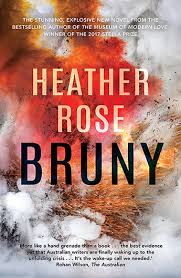Who blew up the Bruny Bridge? From Heather Rose, the Stella-prize winning author of The Museum of Modern Love, comes her latest novel Bruny (Allen and Unwin 2019): a political satire, a fable, an allegorical tale about climate change and globalisation, about the collection of personal information, back room deals and cheap foreign labour, about elections and conspiracies and protest groups and international mediation. It is also Heather Rose’s love song to Tasmania – a state of unspoiled beauty and nature at its most majestic, a state separated from the Australian mainland, a state apart. This is a novel about family and loyalty, about secrets and lies, about sacrifices and choices and a strange new world.
At the centre of the story is the Coleman family. Our narrator, Astrid Coleman (or Ace), works overseas for the United Nations as a conflict resolution specialist, negotiating some of the trickiest and most dangerous places on earth and tackling issues such as terrorism, slavery, prisoner exchanges, hostages, suicide bombers and human rights abuses. But when a bomb goes off in Tasmania, partly destroying the almost constructed (and controversial) bridge connecting the much smaller Bruny Island with Tasmania, Ace agrees to return ‘home’ to help her brother, JC, the state Liberal Premier, who has enough worries with an upcoming election without a possible terrorist attack to deal with. But Ace’s family situation is complex. Her sister, Max, is the Labour Opposition Leader, her father (the much-loved Labour ex-Premier) has dementia and now only speaks in Shakespearian quotes, and her mother is suffering from cancer and making sure everyone else suffers along with her. It seems only the Greens Leader, Amy O’Dwyer, is unrelated by blood, but in a state as small as Tasmania, everyone knows everyone and they all know each other’s business.
Ace’s adult children live in New York and she has come out of a failed relationship. While she agrees to come back temporarily to help, she doesn’t count on the emotional pull of her homeland, the complexities of her family circumstances, the possibility of a new romance, and most importantly, her own divided loyalties and the tough decisions she must make, for the greater good, sometimes against her own better instincts.
Bruny explores all the intricacies of political life and the advantages and potential risks of newly formed allies. In this new world, China is Australia’s newest ally, and a right-wing US President has withdrawn America from the Middle East and from the UN. There is a large cast of characters, from the locals on Bruny Island (home to only 600 residents but a much larger tourist population) to the many politicians, both federal and state, who have a vested interest in what happens on Bruny. With special interest groups and a variety of stakeholders with which to communicate, Ace Coleman is immersed in one of the biggest challenges of her career. There are sinister forces at play – the plot races along with intrigue and action – but the simplicity and beauty of isolated Bruny Island is like a peaceful balm to Astrid’s soul, centering her sense of right and wrong, and questioning her role as peacemaker and negotiator.
This novel is a tongue-in-cheek (some of the characters have great names, such as Aiden Abbott, aka Aid-n-Abet), easy to read, political commentary on the current affairs facing Australia (and the world), and is a meditation on the importance of believing in something real, standing up for those beliefs and being prepared to risk one thing to save another. It’s funny, poignant, fast-paced and thought-provoking.

